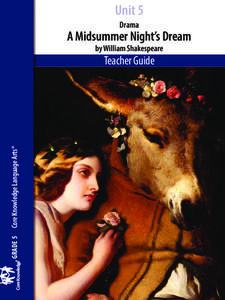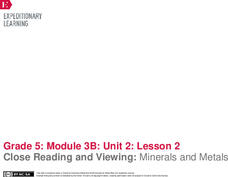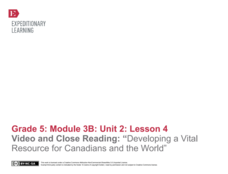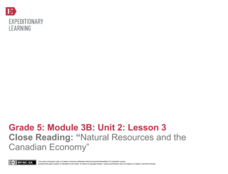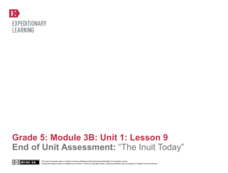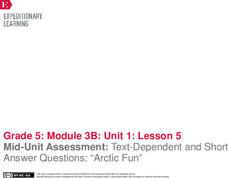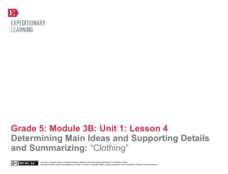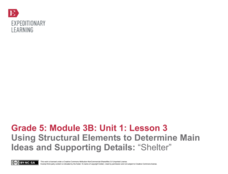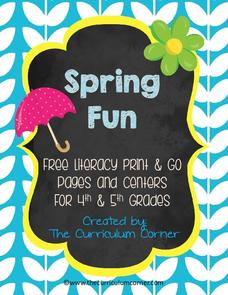Core Knowledge Foundation
Unit 7: Poetry
Over the course of a 12-lesson language arts unit, young scholars analyze a variety of poems taking a close look at figurative language and tone. They learn to compare and contrast, improve comprehension, and identify settings. To...
Core Knowledge Foundation
Unit 5: A Midsummer Night’s Dream
Fifth graders analyze William Shakespeare's A Midsummer Night's Dream, paying close attention to character development, plot, and dialogue. With daily reading and thoughtful discussion, scholars take pen to paper to respond to journal...
Core Knowledge Foundation
Unit 4: The Renaissance
The Renaissance is the theme of a five-week unit designed to boost reading comprehension, spelling, vocabulary, and expository writing skills. Scholars listen to and discuss daily readings and engage in skills practice activities...
Core Knowledge Foundation
Unit 3: Adventures of Don Quixote
Fifth graders explore the Adventures of Don Quixote in a four-week language arts unit. Scholars listen to and discuss a new chapter each day as well as examine vocabulary and practice word work including suffixes, subject-verb agreement,...
Core Knowledge Foundation
Unit 2: Early American Civilizations
Fifth graders explore early American civilizations in a four-week ELA unit. Every lesson offers an opportunity to read and discuss a selected passage followed by word work that covers vocabulary, grammar, and morphology. Learners write...
Core Knowledge Foundation
Unit 1: Contemporary Fiction - They Call Me Güero: A Border Kid’s Poems by David Bowles
They Call Me Güero: A Border Kid's Poems by David Bowles is the focus of a five-week language arts unit unit. Fifth graders listen to various poems and participate in thoughtful discussions, examining vocabulary and learning new words in...
ReadWriteThink
Literature Circles: Getting Started
Make reading more enjoyable and interactive with literature circles! Here you'll find detailed lessons to begin the literature circle process. Ten lessons introduce each role learners take on. Literature circle roles include...
EngageNY
Close Reading and Viewing: Minerals and Metals
How easy is it to live off the land? Scholars read Minerals and Metals in Your Life and discuss how Canada's natural resources meet the needs of the people. Pupils watch a brief video and discuss the gist of the text and video. They then...
EngageNY
Mid-Unit Assessment: Text-Dependent and Short Answer Questions: Excerpts from “A Limited Supply”
There's no such thing as an unlimited resource. Scholars complete a mid-unit assessment by reading A Limited
Supply. They answer text-dependent questions and complete a graphic organizer about key terms in the text.
EngageNY
Video and Close Reading: “Developing a Vital Resource for Canadians and the World”
Scholars watch Developing a Vital Resource for Canadians and the World to learn about the supplement potash that helps plants grow. They watch the video several times, completing a note catcher to record key ideas along the way. Pupils...
EngageNY
Close Reading: “Natural Resources and the Canadian Economy”
Readers continue to learn how natural resources are important to Canada's economy. They read, annotate, and answer text-dependent questions about Natural Resources and the Canadian Economy. They then discuss key terms in the text.
EngageNY
End of Unit Assessment: “The Inuit Today”
Then and now. Scholars complete an end of unit assessment covering The Inuit Thought of It by comparing past and modern day life for the Inuit. They complete a main idea graphic organizer, analyze key terms, and write a summary paragraph.
EngageNY
Synthesizing Text Details to Explain Relationships: “Medicine and Healing”
After reading the section about medicine and healing in The Inuit Thought of It, leaners determine what they feel was the most important resource to surviving in the Arctic environment. They support their opinions with details from the...
EngageNY
Determining Main Ideas and Details to Write a Summary Paragraph: “Food”
Let's eat! Scholars read pages 24-25 of The Inuit Thought of It to discover the foods eaten by the Inuit. They sketch a visual gist of the section in their journals and write a summary paragraph about the text.
EngageNY
Synthesizing Text Details to Explain Relationships: “Hunting”
The class is on the hunt. Scholars read pages 22-23 of The Inuit Thought of It about different hunting techniques of the Inuit people. They sketch a picture of the gist of the section and then complete a web that shows the relationship...
EngageNY
Mid-Unit Assessment: Text-Dependent and Short Answer Questions: “Arctic Fun”
Let's have a little fun! Readers take a mid-unit assessment by answering text-dependent and short-answer questions using the text Arctic Fun. They then complete a form to track their progress in the unit thus far.
EngageNY
Determining Main Ideas and Supporting Details and Summarizing: “Clothing”
Surviving winter. Pupils begin reading on page 18 of The Inuit Thought of It: Amazing Arctic Inventions and sketch how the people used animal skin clothing to survive the winter. Readers complete a main idea graphic organizer with...
EngageNY
Using Structural Elements to Determine Main Ideas and Supporting Details: “Shelter”
Does the picture tell the story? Learners continue their work in The Inuit Thought of It by creating a visual gist of pages 16 and 17. They then complete a main idea graphic organizer and discuss key supporting details.
Florida Center for Reading Research
Vocabulary: Word Analysis, Word-by-Word
Scholars identify word relationships, categorize words, and identify similarities and differences between word meanings.
Curated OER
Vocabulary Instructional Routine: Synonyms
Young scholars work with word cards to define and identify synonyms, antonyms, and homophones. Participants listen to instruction, read word cards, discuss their new-found knowledge, and put it into action by creating sentences and...
Florida Center for Reading Research
Word Knowledge
Turn skills practice into a game of Bingo! Scholars listen to words and locate their synonyms on their Bingo cards. The first play to fill their card wins.
Curriculum Corner
Spring Fun Literacy Centers
Looking for spring-themed literacy centers? Look no further because here is a resource packed full of literacy skills practice, including spring verbs, ABC order, spring synonym match, spring phrases, abbreviation match, and a sentence...
Curriculum Corner
Synonyms and Antonyms
One of these words is not like the other! Test grammarians' knowledge of synonyms and antonyms with an activity that challenges scholars to locate three synonyms, an antonym, and record their findings on a worksheet.
Curriculum Corner
Guest Teacher Plans Grade 5
Math, reading, writing, and word work; it's all here in a daily lesson plan created to support a substitute teacher in a fifth grade class.



